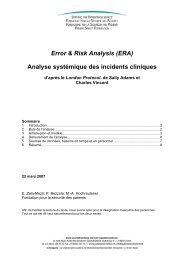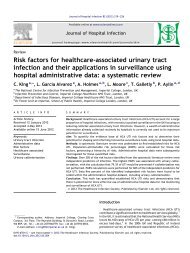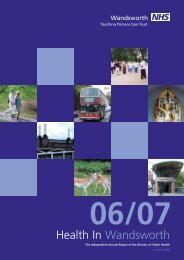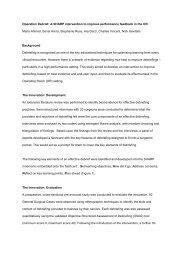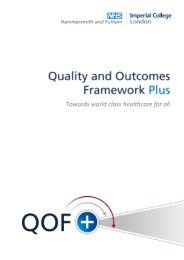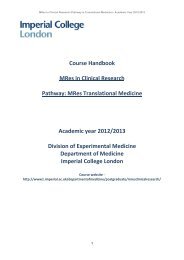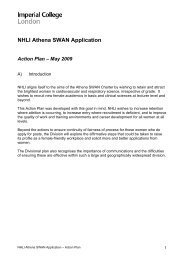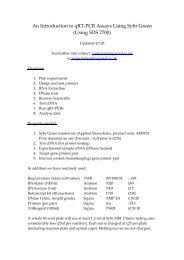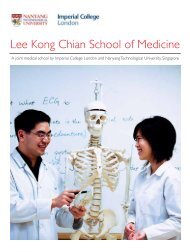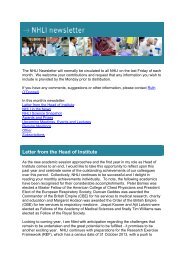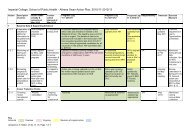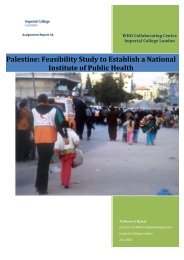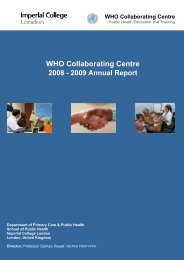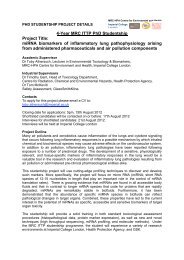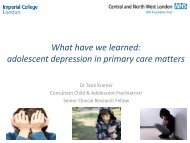APPLICANT - Imperial College London
APPLICANT - Imperial College London
APPLICANT - Imperial College London
You also want an ePaper? Increase the reach of your titles
YUMPU automatically turns print PDFs into web optimized ePapers that Google loves.
CODE: KCL/009<br />
F1<br />
F2<br />
See rotation<br />
for site<br />
Guy’s and<br />
St Thomas’<br />
NHS<br />
Foundation<br />
Trust<br />
General<br />
Medicine (St<br />
Thomas’<br />
Hospital)<br />
3m<br />
Elderly Care<br />
(St Thomas’<br />
Hospital)<br />
Haematology 4m General<br />
Medicine<br />
3m<br />
4m<br />
Orthopaedics<br />
(Guy’s<br />
Hospital)<br />
Pharmacology<br />
(Academic<br />
Attachment)<br />
3m<br />
4m<br />
General<br />
Surgery<br />
(Vasc) (St<br />
Thomas’<br />
Hospital)<br />
3m<br />
Guy’s Drug Research Unit (GDRU) now Quintiles Drug Research Unit at Guy’s Hospital<br />
evolved from the interaction of academics at Guy’s Hospital Medical School and the<br />
Pharmaceutical Industry working together in early drug development. The Unit has<br />
investigated over 300 new small molecules and biologics in man. Quintiles Drug Research<br />
Unit has a 75 bed unit adjacent to the Hodgkin Building at the Guy’s site of King’s <strong>College</strong>,<br />
<strong>London</strong> and a 35 bed unit on the 14 th floor of the Tower Wing also on the Guy’s site. In 1995<br />
GDRU was acquired by Quintiles, the leading international contract research organisation.<br />
Founded in 1982 by Dennis Gillings, a British biostatistician then based at the University of<br />
North Carolina, Quintiles now has approximately 20,000 employees and has offices in more<br />
than 50 countries. Quintiles has helped develop or commercialise every one of the world’s<br />
top 30 best selling drugs. Training and experience will be available in exploratory, early<br />
phase drug development, tailored to suit the trainee. Most of the training offered will be<br />
available on the Guy’s site: subjects may include management principles and skills, good<br />
clinical practise, communication skills, computer skills, assisting in writing informed consent<br />
documents and Ethics Committee applications, conducting and writing up a personal<br />
research project and the place of research and higher degrees in training for clinical<br />
careers. The senior medical staff are Professor Tim Mant, Dr Darren Wilbraham, Dr<br />
Marianne Kasti and Professor James Ritter. The associated F2 clinical attachments will be<br />
Haematology and General Medicine (Respiratory).<br />
Post 10 – Asthma, Allergy and Respiratory Medicine (Professor T Lee) – based at<br />
GSTT<br />
CODE: KCL/010<br />
F1<br />
F2<br />
St Thomas’<br />
Hospital<br />
Guy’s and<br />
St Thomas’<br />
NHS<br />
Foundation<br />
Trust<br />
Trauma &<br />
Orthopaedics<br />
Accident &<br />
Emergency<br />
3m<br />
4m<br />
General<br />
Surgery<br />
(Lower GI)<br />
Allergy/<br />
Respiratory<br />
Medicine<br />
3m Rheumatology 3m General<br />
Medicine<br />
4m GUM 4m<br />
3m<br />
The post will be based within the Division of AALB in KCL, which has very close links with<br />
the Allergy and Respiratory Medicine NHS Services at Guy's & St Thomas' NHS Foundation<br />
Trust. The Divisional research programmes are internationally competitive. In 2005 the MRC<br />
awarded funds to establish a MRC-Asthma UK Centre in Allergic Mechanisms of Asthma at<br />
KCL in partnership with Asthma UK, <strong>Imperial</strong> <strong>College</strong> and associated NHS Trusts. Divisional<br />
research programmes are supported by three current programme grants (one from MRC,<br />
one from Wellcome Trust and one from NIHR); grants from the Immune Tolerance Network;<br />
and Food Standards Agency. The total value of research awards in the Division is c. £31.4m.<br />
Broad research areas covered include IgE structure, function and regulation; airways<br />
inflammation and remodelling; prevention and therapy of allergy, asthma and chronic<br />
respiratory morbidity; tight junction biology; the EFGR network in normal airway epithelium<br />
and lung cancer; and Endobronchial Ultrasound in the diagnosis and management of<br />
Thoracic Diseases. The clinical/basic science interface is key to the Division’s success.<br />
Close interactions between non-clinical and clinical scientists provide improved opportunities<br />
for new ideas to arise and for discoveries from gene to bedside to be fully exploited for the<br />
www.stfs.org.uk/student/academic-programmes<br />
Email: tfsacademicrecruitment@stfs.org.uk<br />
Page 49 of 70<br />
Updated: 27 May 2010



